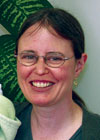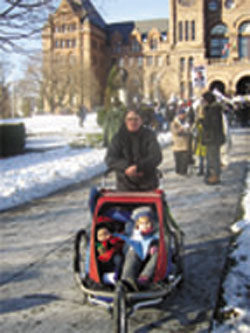
Climate change ... Time to choose our story
We can leave a larger ecological debt for future generations or live more simply and sustainably now
By Karen Van Loon
March/April 2008
Return to Table of Contents
Print Article
The United Nations Development Program (UNDP) calls climate change "the defining human development issue of our generation" and says that "no issue merits more urgent attention – or more immediate action." The UNDP's 2007/2008 Human Development Report, Fighting Climate Change: Human solidarity in a divided world, warns that climate change "has the potential to result in large-scale human development setbacks, first slowing, then stalling and reversing progress in poverty reduction, nutrition, health, education and other areas."
The report highlights the underfinancing of international funds to help developing countries adapt to the effects of climate change. The amount promised so far is US$279 million for dispersal over several years – less than a quarter of what the United Kingdom spends in one year on flood defence.
Desmond Tutu, Archbishop Emeritus of Cape Town, says in the report that "leaving the world's poor to sink or swim with their own meagre resources in the face of the threat posed by climate change is morally wrong...We are drifting into a world of 'adaptation apartheid'." He points out that most people in rich countries can adapt to extreme weather with a thermostat or be protected from floods by government built defence systems. In contrast, the world's poorest people face the harsh reality of climate change in their everyday lives. An impoverished woman farmer in Malawi may adapt to more frequent droughts by reducing food from an already inadequate diet or by taking her children out of school.
"Climate change threatens a 'twin catastrophe', with early setbacks in human development for the world's poor being succeeded by longer term dangers for all of humanity... Yet it also provides an opportunity to come together and forge a collective response to a global problem. It is my hope that we will rise as one to face this challenge, and leave a better world for future generations."
United Nations Secretary-General Mr. Ban Ki-moon in a special contribution to the 2007/2008 UNDP Human Development Report
The G8, or group of eight major industrialized countries including Canada, account for 13 percent of the world's population but 40 percent of the world's carbon dioxide emissions according to UNDP Report statistics. Canadians have the second highest emissions per person among the G8, with the US in first place. Malawi's emissions are so low they register as zero percent of world emissions.
With every day of inaction on climate change we increase the risk of a "twin catastrophe," the UNDP report says. The world's poorest people stand on the front lines of an ecological crisis caused primarily by wealthy nations. Ecological disaster awaits future generations. Unless we change.
Our stories
I have two small children, a daughter who is five and a son almost three. I sometimes wonder what it would be like to be a grandmother. It's almost traditional for grandparents to tell stories illustrating how much more difficult life was for them. My grandmother left an impression on me with her story about living in Holland during World War II and having to go out to milk the cows despite bombs falling not that far away. What stories will I tell my grandchildren? Will it be my grandchildren who will live through the more difficult times? What stories will they and future generations tell about us?
The signs of the times are increasingly obvious. Glaciers retreating. Polar ice melting. Hotter summers. More intense hurricanes. Dire warnings about climate change in the news.
Climate change is happening now. And it is mostly due to human activities. In the last 100 years the global average temperature has increased by about 0.74 degrees Celsius with 0.3 degrees since 1990. This may not seem like much until one looks at some likely impacts on the ecosystems of the Earth with each degree Celsius above 1990 levels:
- 1 degree: bleaching of most coral reefs, habitat for about 25 percent of marine species
- 2-3 degrees: mass mortality of coral reefs globally and about 25 to 30 percent of species at increasingly high risk of extinction
- more than 3.5 degrees: major extinctions around the globe (40 to 70 percent of species assessed).
By the end of the 21st century the projected average global warming ranges from 1.1 to 6.4 degrees Celsius, depending on our actions, including how intensively we continue to use fossil fuels.
Impacts will be felt everywhere but some people are more vulnerable. Most damage will occur in developing countries. By 2020, between 75 and 250 million people in Africa are projected to experience increased water shortages. Agricultural production and food security in many African countries will likely be severely compromised. Small island inhabitants expect increased flood damage. Arctic communities will face damaged infrastructure as the permafrost melts, along with a loss of indigenous culture and traditional way of life. Even in areas of the world with high incomes, the poor, young children, and the elderly can be more at risk.
Global warming could lead to some impacts that are abrupt or irreversible. Partial or total melting of the ice sheets in Greenland and the West Antarctic, occurring over centuries or longer, would cause massive coastline flooding, ecosystem losses, as well as costly and difficult relocation of people and infrastructure.
"...we can understand better the importance of giving attention to what the earth and its atmosphere are telling us: namely, that there is an order in the universe which must be respected, and that the human person, endowed with the capability of choosing freely, has a grave responsibility to preserve this order for the well-being of future generations. I wish to repeat that the ecological crisis is a moral issue."
Pope John Paul II, 1990 World Day of Peace Message
Adaptation can significantly reduce many unavoidable or potentially dangerous impacts of climate change. However, ecosystems, upon which we depend, have very limited adaptation capacity. Over time the magnitude of climate change will likely make adaptation impossible or extremely costly. Unless we cut our greenhouse gas emissions.
Global emissions must peak by 2015 and then substantially decrease so that the global temperature can eventually stabilize at a lower level of warming. Yet, even at this lower level there is increased risk of Greenland's ice sheet melting and species being lost. Delaying action seriously reduces opportunities to stabilize at lower temperatures and raises the risk of progressively more severe climate change impacts.
We can reduce emissions at a reasonable cost through lifestyle and behaviour changes, known technologies and effective policies. These were some of the findings in the 2007 report by the UN Intergovernmental Panel on Climate Change (IPCC)* set up to provide objective information about climate change. This report was developed by more than 2,500 scientific expert reviewers and hundreds of authors from more than 130 countries.
Other recent scientific reports suggest that climate change is happening more rapidly than the IPCC report predicts. The U.S. National Snow and Ice Data Center reported that Arctic sea ice reached such a record low in September 2007 that scientists estimate the Arctic Ocean could be ice free in the summer by 2030. This is at least 20 years earlier than some worst-case IPCC projections.
Wisdom to guide us
When we look at this reality we sense something wrong with the values reflected. How did we get here? To various extents we listened to the wisdom of the market calling us to consume more and to enjoy the convenience and status of possessing the latest gadgets or styles. Success means profit and endless economic growth even as it wears down people and all of creation.
Climate change is calling us to reconnect with the wisdom of our faith and that of other faith traditions, especially Aboriginal Spirituality, which maintains a greater awareness of our interconnectedness with the Earth and responsibility as caretakers to preserve the Earth for future generations.
 Monarch butterflies are threatened by milkweed destruction, as milkweed is the only food monarch caterpillars can eat.
Monarch butterflies are threatened by milkweed destruction, as milkweed is the only food monarch caterpillars can eat.
KAIROS, the coalition of Canadian churches and religious organizations working for justice, has drawn out some of the wisdom found in the Christian faith:
- We believe that the world as God's handiwork has its own inherent worth and value.
- We believe that we share in God's covenanted relationship with all of Creation.
- We believe that the way we treat the poor and the vulnerable and all Creation is a reflection of our faithfulness to God.
- We believe that God wants people to live in mercy, compassion and mutual respect of other humans and all Creation and that this will be the basis for peace and justice.
- We believe that God intends restoration through Christ, inviting our collaboration in acts of healing and transformation.
Our collaboration in the restoration of creation calls for action based on solidarity, the common good and the participation of all. In 2003, the Canadian Conference of Catholic Bishops wrote a pastoral letter on the Christian Ecological Imperative: "You love all that exists... all things are Yours, God, lover of life". They outline three responses found in the Christian tradition – the contemplative, the ascetic and the prophetic – to guide our actions in response to climate change.
The contemplative response
If all the climate change warnings have us feeling down, then a good beginning would be to slow our pace and find time for reconnecting with creation and re-energizing our soul. In creation we behold "the glory of the Trinity" and "must contemplate, sing and rediscover wonder" according to Pope John Paul II. Nature, the Pope said, "becomes a gospel which speaks to us of God."
We don't have to travel far and use lots of fossil fuel to rediscover wonder. Explore your garden or backyard, neighbourhood or nearby park, woodland or lake. Many of us have lost touch with creation that surrounds us – we no longer know our local plants, animals and insects. We think this knowledge has little value in our lives. Yet, acting out of this disconnection can have adverse consequences on us and on the life around us.
We risk losing opportunities for discovering God's wisdom embedded in creation around us, like the monarch.s transformation from caterpillar to butterfly.
Living in Toronto, I only occasionally see butterflies so they are a source of wonder especially for our children. Habitat loss and now climate change threaten monarch butterflies. We risk losing opportunities for discovering God's wisdom embedded in creation around us, like the monarch's transformation story from caterpillar to butterfly. Taking the time to reconnect with the wonder and beauty of creation re-energizes us to action so that climate change will not result in our world losing ever more of such experiences for future generations.
The ascetic response
By various calculations if everyone in the world were to live the lifestyle of the average Canadian we would need several more planets. The UNDP estimates nine planets to sustain Canada's carbon dioxide emissions. We can leave an ever larger ecological debt for future generations to pay – or we can make lifestyle changes now to reduce our greenhouse gas emissions and live more simply and sustainably.
In fall 2007, KAIROS began a three-year campaign, Re-energize: Time for a Carbon Sabbath, exploring our dependence on fossil fuels and seeking more just and sustainable alternatives. The KAIROS Re-energize website features two calculators for use by adults or children to determine your ecological footprint, with ideas to help reduce it.Simple ways to reduce energy consumption include:
- Taking public transportation, walking, biking, car pooling.
- Flying less, using video conferencing, vacationing locally.
- Buying less and locally produced if possible (oil is used to produce and transport many things we buy).
- Repairing, reusing, sharing, recycling, composting.
- Eating more locally produced or organic food, and less meat.
- Creating an energy efficient home.
Faith and the Common Good, an interfaith network, has developed a program called Greening Sacred Spaces to assist faith communities in reducing greenhouse gases and living more sustainably. Scarboro Missions is participating in a Greening Sacred Spaces pilot project which began in 2004. This included implementing some building retrofits that are already saving energy. In June 2007 Scarboro missioners participating in the General Chapter unanimously supported a Justice and Peace Office proposal to prioritize work on climate change and ecological justice over the next five years.
The prophetic response
As Christians in a world confronting the realities of climate change, we are called to care for the Earth and for the vulnerable and to work for justice and healing, solidarity and the common good. What can we do?
Speak out: Increasingly, ordinary Canadians are making personal changes to reduce greenhouse gas emissions and want to see more action from government and business leaders. Silence is interpreted as satisfaction with the way things are. Speak to neighbours and friends, to city council or government representatives. Write letters to the editor.
 Scarboro missioner Karen Van Loon and her family were among 3,000 people who participated in this family friendly climate change demonstration in Toronto on December 8, 2007, part of a worldwide action.
Scarboro missioner Karen Van Loon and her family were among 3,000 people who participated in this family friendly climate change demonstration in Toronto on December 8, 2007, part of a worldwide action.
Participate in public actions: Earth Hour, a global effort to raise awareness by turning off your lights for an hour, took place on March 29, 2008. This was a symbolic opportunity for a faith community gathering or for advocacy with local governments to address climate change. On December 8, 2007, demonstrations were held around the world with 30 events across Canada, coinciding with the United Nations climate talks taking place in Bali, Indonesia. Participants called on world leaders to take urgent action to prevent dangerous climate change, including a stronger emissions reductions treaty.
Call for effective emissions reductions: In Bali, both Canada and the United States worked against agreement on emissions reduction targets for industrialized countries of 25 to 40 percent below 1990 levels by the year 2020. These targets are in line with the IPCC report for a lower level of global warming.* Canada's current objective is 20 percent below its 2006 level by 2020, still slightly above its 1990 level. Canada is also not reaching its current commitments under the Kyoto Protocol, a binding international agreement setting targets for industrialized countries to reduce greenhouse gas emissions first as they are most responsible for climate change.
Examine how tax dollars are spent: In November KAIROS called on the Canadian government to justify giving billions of dollars in tax breaks to Canada's profitable oil and gas corporations while spending relatively less on energy efficiency, conservation, and renewable alternatives that reduce greenhouse gas emissions. The oil sands development in Western Canada is the largest source of growth in Canada's greenhouse gas emissions, producing two-and-a-half times more greenhouse gas than pumping conventional oil. The KAIROS Re-energize campaign calls for a government audit of subsidies to the fossil fuel industry. Read the Re-energize box (pages 7-8) to learn more and find out how to participate.
Support a price on carbon emissions: KAIROS and the UNDP are calling for urgent action, including a price on carbon emissions (which the chairman of the IPCC says is "absolutely crucial"), to keep the global temperature increase below 2 degrees Celsius and avoid dangerous climate change. A price on carbon emissions reflective of its real ecological and social cost is needed to change the behaviour of corporations, organizations and individuals away from excessive fossil fuel consumption and towards conservation, energy efficiency and renewable energy. And consideration has to be given
Advocate for renewable energy: KAIROS proposes that Canada adopt a target of 20 percent renewable energy (such as wind, solar, biogas) by 2020. Toronto neighbours are organizing together to get a better deal on solar hot water and electric systems, and becoming alternative energy generators. Sweden already gets 29 percent of its energy from renewable sources and wants to end its dependence on fossil fuels by 2020. In 2006 the Swedes opened the world's largest biogas plant which converts sewage and other waste into fuel.
What story will we choose?
In its Re-energize campaign, KAIROS says, "While the current state of our planet represents the gravest of crises, we are not without hope or vision; our faith does not permit the luxury of despair. The resurrected Christ restores us to a right relationship with God, one another, and the rest of God's Creation upon which we depend."
I hope the stories I tell my grandchildren will be about how we all worked creatively and generously together for a healthier and more sustainable planet – our home. May our stories speak of solidarity and not of devastating consequences for our Southern neighbours. May we be "good news" for our grandchildren and for future generations.
Scarboro lay missioner Karen Van Loon is the coordinator of Scarboro's Justice and Peace Office.
Main IPCC 2007 AR4 sources; AR4 Synthesis Report: Summary for Policymakers; WG II Report, Ch. 19, Schneider et al.; WG II Report: Summary for Policymakers; WG III Report, Ch. 13, Gupta et al.
Resources
KAIROS Re-energize campaign (www.re-energize.org): Resources for changing ourselves, our church and school communities, and the world. Teacher resources K-12 at www.zerofootprintkids.com
Greening Sacred Spaces (www.faith-commongood.net/gss): Interfaith practical program assisting faith communities to live more sustainably.
David Suzuki Foundation (www.davidsuzuki.org/Climate_Change/): Lots of background information, fact sheets, news updates, action ideas.
Canadian Youth Climate Coalition (www.ourclimate.ca): Youth uniting and taking action in schools and communities across Canada. Creative ideas!
Ontario EcoSchools (http://www.ontarioecoschools.org): School board designed program addressing waste minimization, energy conservation, school ground greening, and ecological literacy.
Return to Table of Contents
Print Article